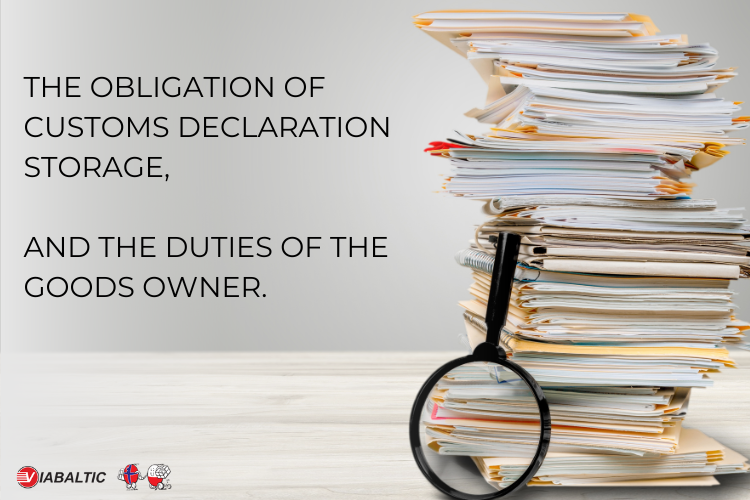The obligation of customs declaration storage, and the duties of the goods owner.

A customs declaration is of crucial importance in international trade and contains detailed information about goods crossing national borders, including description, value, country of origin, and other essential information. A correctly completed customs declaration ensures proper customs clearance and accurate payment of duties and taxes.
It is essential to be aware of who is responsible for the content of, as well as the storage of, the customs declarations.
Who is obliged to submit the declaration?
According to the Norwegian Customs, § 1-3.Definisjoner : the person liable to declare is «the person who submits a declaration in his own name, or the person on whose behalf the declaration is submitted». They further state that this applies both to the import and export of goods.
For example, a company that uses a customs representative/forwarder to deliver declarations in the company’s name is still the one who is obliged to declare.
https://www.toll.no/no/verktoy/regelverk/handboker/vareforselshandboken/1/1-3/
Who is responsible for storage of the customs declarations?
It is a common misunderstanding that the storage obligation lies with the customs representative/forwarder who makes the declaration. Many goods owners also use several customs representatives/freight forwarders, which complicates the collection while inspection.
Regulations on the import and export of goods, the Goods Transport Regulations § 7-5-1. state that:
«The storage obligation does not apply to the person who declares goods on behalf of another»
https://lovdata.no/dokument/SF/forskrift/2022-10-27-1901/KAPITTEL_7#%C2%A77-5-1
It is therefore the goods owner who is responsible for storage of the customs declarations.
What should be stored?
It is important to note that the storage obligation applies to both the declaration and the sub-appendices.
According to the Transport of Goods Regulations § 7-5-1. Storage obligation also includes:
«… basic documents etc. which is linked to the declaration or notification. By basic documents is meant documents associated with declarations and notifications […], including invoices, bills of lading, waybills and similar shipping documents, permits and certificates of origin»
https://lovdata.no/dokument/SF/forskrift/2022-10-27-1901/KAPITTEL_7#%C2%A77-5-1
How long the declarations must be stored?
The storage period for customs declarations is usually five years, counted from the end of the year the declaration was received by the customs authorities. It is important to be aware that the customs authorities can impose an extended storage period if necessary. Remember that basic documents must also be stored for the same length of time. (See the Transport of Goods Regulations § 7-5-2. Storage time for exceptions and more details related to storage time)
There are also requirements for how the customs declarations must be stored. The transport regulations § 7-5-1. Storage obligation state that:
«Material subject to retention must be stored in an orderly manner and be reliably secured against destruction, loss and alteration. The material must be able to be presented to the customs authorities in a form that enables control throughout the storage period.»
https://lovdata.no/dokument/SF/forskrift/2022-10-27-1901/KAPITTEL_7#%C2%A77-5-1
The important follow-up checks and the goods owner’s responsibility.
Follow-up checks are essential to ensure accuracy and compliance with customs regulations. This includes reconciling the declaration overview, checking that the information is correct and ensuring that all declarations have been received.
The goods owner is responsible for checking and ensuring that the information is correct.
When checking the declaration overview against the invoice and declaration, check that there are no discrepancies between the two.
It is also important to note that the information on the customs declaration constitutes documentation for the VAT basis and any right of deduction.
To summarize, we can state the main points:
– The goods owner is responsible for keeping their customs declarations
-The customs representative/freight forwarder does not have a storage obligation on behalf of its customers
-Customs declarations as well as basic documentation must be kept
-The storage period for customs declarations is usually five years, counted from the end of the year the declaration was received by the customs authorities
-The goods owner is responsible for checking the information and content of his customs declarations
